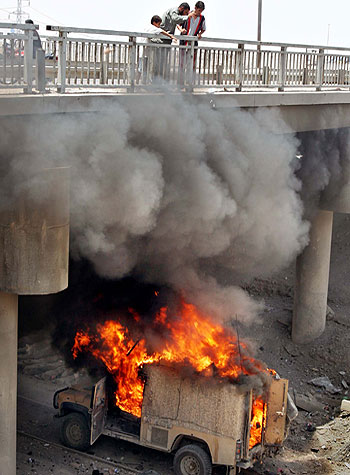
Three Iraqis standing on a bridge look down as one of them pours petrol onto a burning British military vehicle after a roadside bomb attack (AP)
BAGHDAD, Iraq, AP -Violence killed five Iraqis and wounded dozens Sunday as Iraq’s new national unity government met for the first time with security high on its agenda.
The attacks all occurred in Baghdad, the capital, as Iraqis headed back to work and school after their weekend Friday and Saturday.
In the deadliest strike, two roadside bombs exploded at about 10:30 a.m. in a crowded fruit market in New Baghdad, a mixed Shiite, Sunni Arab and Christian area in an eastern part of the capital, said police Lt. Ali Abbas.
Police found the first bomb and detonated it after trying to evacuate the market, said Abbas. But a second hidden bomb exploded a moment later, killing three civilians and wounding 23, all of whom had ignored the evacuation order, Abbas said.
At about 8 a.m., four gunmen in a speeding BMW killed Ali Abdul-Hussein al-Kinani, 57, who was standing outside his food store in the mostly Shiite neighborhood of Ubaidi, said police Maj. Mahir Hamad Moussa.
In southwestern Baghdad, a roadside bomb missed its target — a police patrol — but wounded five civilians at 8 a.m., in the mostly Sunni Arab neighborhood of Sadiyah, said police Capt. Jamil Hussein.
Three other attacks took place Dora, one of Baghdad’s most violent areas. Mortar rounds hit two separate houses, killing a 4-year-old girl and wounding her mother in one dwelling, and injuring a man and his son in the other, police said. A roadside bomb narrowly missed a U.S. convoy but wounded three civilians.
On Saturday, parliament inaugurated Prime Minister Nouri al-Maliki and his new government, which hopes to improve the Iraq’s military and police forces, persuade the insurgents to lay down its weapons and disband militias, reduce sectarian violence and restore stability to Iraq.
Accomplishing all that would set the stage for the eventual withdrawal of tens of thousands of U.S. and other foreign troops.
But political infighting left three important posts in the Shiite, Sunni and Kurdish Cabinet temporarily filled — the very ones responsible for managing Iraq’s army, police forces and national security.
Al-Maliki’s said he is determined to soon find independent, nonsectarian officials to fill those three portfolios, and his new Cabinet was expected to discuss that during its first meeting Sunday.
The closed meeting began about midday in the Prime Ministry building in Baghdad’s heavily fortified Green Zone, which serves as a command center for U.S. forces in Iraq.
Al-Maliki’s national unity government took office Saturday, five months after the election of Iraq’s parliament and following prolonged bitter wrangling over the Cabinet posts.
At least 33 people were killed in a series of attacks across Iraq on Saturday, and police found the bodies of 22 Iraqis who apparently had been kidnapped and tortured by death squads.
The new permanent government has been portrayed by Western officials as the best hope for changing the dynamics of violence in Iraq.
In a sign of the divisions that held up forming the government, al-Maliki could not work out an agreement on the Cabinet’s three posts responsible for security and had to appoint himself and two deputy prime ministers to temporarily hold those positions.
Still, President Bush, who is facing rising criticism at home over Iraq, welcomed the new Cabinet and promised continued U.S. help.
“The United States and freedom-loving nations around the world will stand with Iraq as it takes its place among the world’s democracies and as an ally in the war on terror,” Bush said.
U.S. Ambassador Zalmay Khalilzad repeated U.S. cautions against expectations of a quick pullout of the 132,000-strong American military contingent. But, he added, “strategically, we’re going to be moving in the direction of downsizing our forces.”
Bush’s top ally in the war, British Prime Minister Tony Blair, said: “Despite all the attempts to disrupt the political process they have a government, a government … of national unity for the first time.”
Blair said coalition soldiers hoped to transfer their duties to Iraqis as soon as possible, but that British troops would remain in Iraq for as long as they were needed.
Italian Foreign Minister Massimo D’Alema said Saturday that the new government would begin planning the withdrawal of its troops from Iraq next week. Japan is also mulling a pullout.
Al-Maliki, a Shiite Muslim who spent years in exile in Syria during Saddam Hussein’s regime, promised that restoring security would be his top priority.
“The first challenge we face is security and how to deal with the terrorist killers who are destroying the country and shedding the blood of the Iraqi people,” he said.

An Iraqi female parliamentary member waits for the parliament session to start (EPA)

Iraqi Prime Minister Nuri al-Maliki smiles while acknowledging parliamentarians in Baghdad (R)
